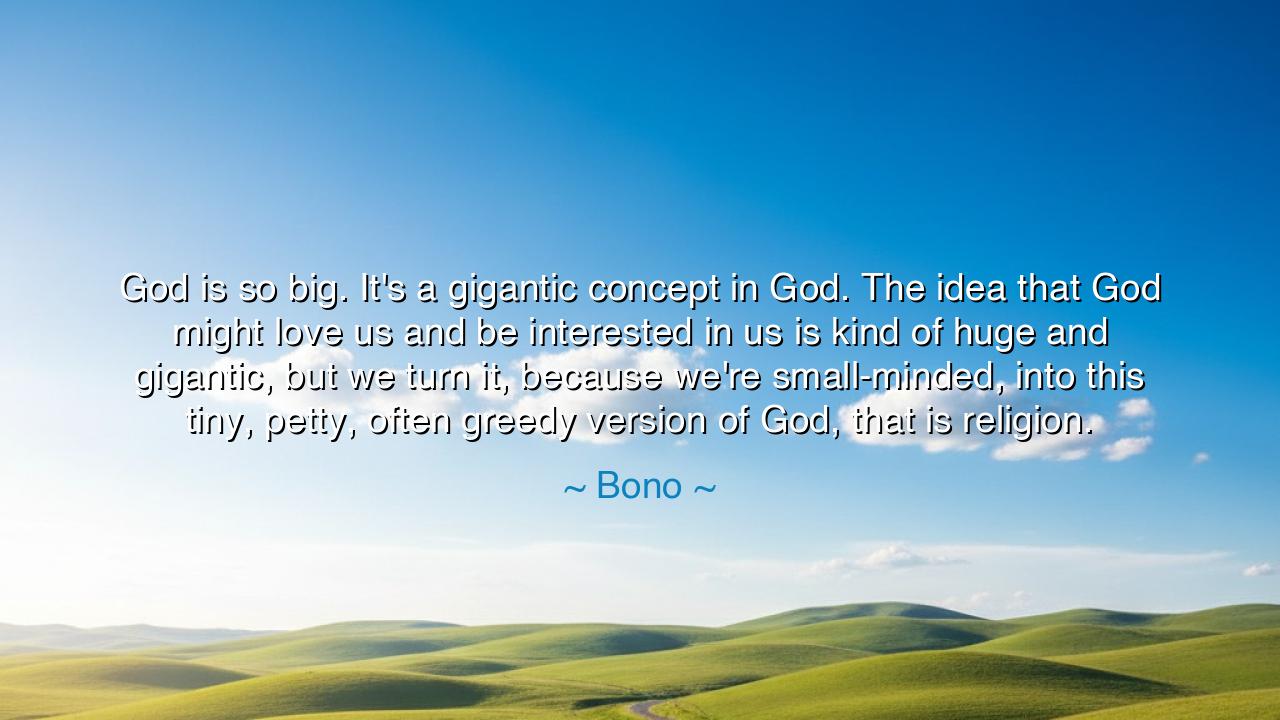
God is so big. It's a gigantic concept in God. The idea that God
God is so big. It's a gigantic concept in God. The idea that God might love us and be interested in us is kind of huge and gigantic, but we turn it, because we're small-minded, into this tiny, petty, often greedy version of God, that is religion.






In the grand sweep of human history, there are ideas that transcend the ordinary, that inspire awe and wonder, and that call us to reflect on the deepest mysteries of existence. One such idea is God, a concept so vast, so incomprehensible, and yet so intimately connected to the hearts of all people. In his reflection, the renowned Bono, lead singer of U2, captures this truth when he says, “God is so big. It’s a gigantic concept in God. The idea that God might love us and be interested in us is kind of huge and gigantic, but we turn it, because we’re small-minded, into this tiny, petty, often greedy version of God, that is religion.” These words stir the heart, for they speak to a paradox that has existed across the ages: the challenge of conceiving a God whose love and presence are boundless, and yet, through the lens of human limitation, we often reduce God to something smaller, something that fits into the confines of our own narrow understanding.
The concept of God has always been one of immensity and mystery. In the ancient Hebrew scriptures, the God of Israel is described as the Creator of heaven and earth, a force whose presence fills the entire universe, who speaks the world into existence and holds all things in the palm of His hand. This God is not a localized deity, constrained by human boundaries, but a being whose presence and power stretch beyond the scope of human comprehension. The prophets of ancient times, like Isaiah, spoke of this God as sovereign over all creation, unapproachable yet deeply concerned with the fate of humanity. This is the gigantic concept of God that Bono refers to—an idea so vast, so filled with wonder and mystery, that it should inspire awe in the hearts of those who dare to consider it.
Yet, Bono’s words point to a tragic human tendency—that of reducing the divine to something that fits within our own limited understanding. Over centuries, religion has often shrunk the divine down to something more manageable, more human. The ancient gods of Greece and Rome were often portrayed in human form, with human desires, weaknesses, and petty conflicts. In Christianity, there have been countless debates and interpretations that have sought to define and categorize God, to turn the divine mystery into something that could be understood, controlled, and, at times, manipulated. These smaller, more humanized versions of God can lead to what Bono calls "petty" and "often greedy" views, where religion becomes about rules, power, and control, rather than the boundless love and compassion that should define the divine relationship.
This tension between the vastness of God and the smallness of human understanding can be seen in the story of Nicodemus, a Pharisee who sought out Jesus in the darkness of night to understand his teachings. Jesus spoke to him of being "born again" and of the spirit being like the wind—invisible, mysterious, and uncontrollable. Nicodemus, unable to comprehend this vast concept, asked, “How can this be?” Just as in Bono’s reflection, the bigness of God’s love and presence is often too much for human minds to grasp. Instead of embracing the infinite, we often retreat to something familiar, something small, that we can control and contain. It is in these moments, when we struggle to understand the immensity of divine love, that we risk shrinking God into a petty version of ourselves.
The history of religion is filled with examples of this shrinking of the divine. During the medieval period, the Church often presented God as a distant, judgmental figure, whose love was conditional upon human obedience. This version of God was one of punishment and reward, far removed from the compassionate Creator that Bono refers to—one who is truly concerned with the well-being of His creation. Martin Luther, in his rebellion against the Church, sought to return to the idea of a gracious God, a force of love and freedom, rather than a petty ruler who demanded compliance. Luther's insight aligns with Bono’s—that the true nature of God is vast and transformative, not small and controlling.
Yet, there is a deeper lesson that Bono offers us in his reflection. If we are to embrace the immensity of God, we must be willing to let go of our small-minded ways and open ourselves to a deeper understanding. To truly encounter the divine, we must allow ourselves to be humble in the face of mystery, to accept that God’s love cannot be contained within the limits of our understanding. Self-examination and humility are key to letting go of our small, humanized versions of the divine. Only through this humility can we begin to experience the bigness of God’s love—love that is unconditional, transformative, and all-encompassing.
In our own lives, we must be careful not to reduce the divine to something petty and small, nor to allow religion to become a tool of control and division. Instead, we must seek to expand our hearts to the vastness of divine love, allowing it to guide us toward deeper connection with others and with the divine itself. Whether through acts of compassion, service, or reflection, we must embrace a vision of God that is larger than our own limitations. By doing so, we come to realize that the joy of life lies not in controlling the divine, but in surrendering to its immensity, in allowing ourselves to be transformed by a love that is boundless and eternal.






AAdministratorAdministrator
Welcome, honored guests. Please leave a comment, we will respond soon